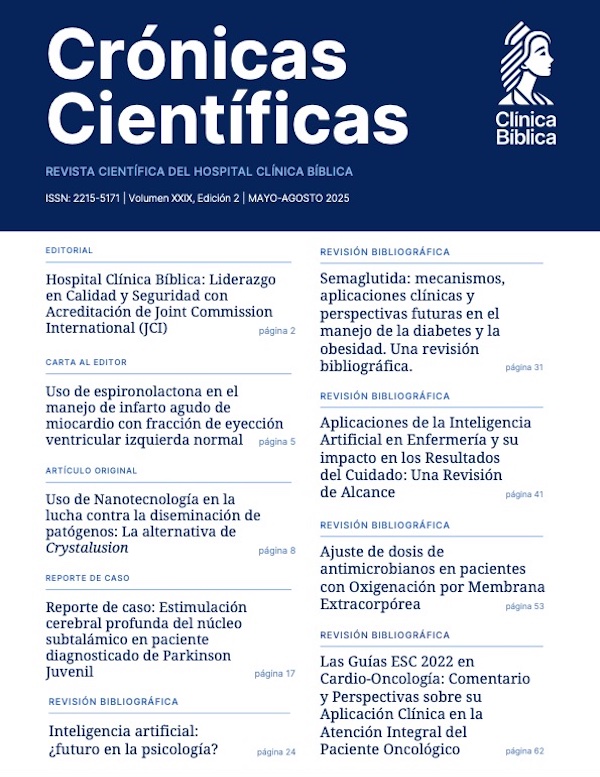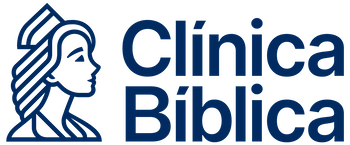- Visto: 1034
Revisión Bibliográfica
Síndrome de distress respiratorio en covid-19
Covid-19 associated respiratory distress syndrome
DOI: https://doi.org/10.55139/AMTE4041
APA (7ª edición)
Ruiz Loría, V., Elizondo Vincenzi, G., & Espinoza Porras, S. (2021). Síndrome de distress respiratorio en covid-19. Crónicas científicas, 20(20), 1-13. https://doi.org/10.55139/AMTE4041.
Vancouver
Ruiz Loría V, Elizondo Vincenzi G, Espinoza Porras S. Síndrome de distress respiratorio en covid-19. Cron cient. 2 de diciembre de 2021; 20(20):1-13.
Dra. Viviana Ruiz Loría
Médico General.
Licenciatura en Medicina y Cirugía, Universidad de Ciencias Médicas (UCIMED). San José, Costa Rica.
Miembro del Colegio de Médicos y Cirujanos de Costa Rica. San José, Costa Rica.
Médico general en el Hospital Dr. Rafael A. Calderón Guardia. San José, Costa Rica. Caja Costarricense del Seguro Social (CCSS). San José, Costa Rica.
Investigadora Independiente. San José, Costa Rica.
Dra. Giuliana Elizondo Vincenzi
Médico General.
Licenciatura en Medicina y Cirugía, Universidad de Ciencias Médicas (UCIMED). San José, Costa Rica.
Miembro del Colegio de Médicos y Cirujanos de Costa Rica. San José, Costa Rica.
Asistente de Dirección y Docente del Centro de Simulación, Universidad de Ciencias Médicas (UCIMED). San José, Costa Rica.
Investigadora Independiente. San José, Costa Rica.
Dra. Stefanny Espinoza Porras
Médico General.
Licenciatura en Medicina y Cirugía, Universidad Latina de Costa Rica. San José, Costa Rica.
Miembro del Colegio de Médicos y Cirujanos de Costa Rica. San José, Costa Rica.
Médico General en el Hospital Dr. Rafael A. Calderón Guardia. San José, Costa Rica. Caja Costarricense del Seguro Social (CCSS). San José, Costa Rica.
Investigadora Independiente. San José, Costa Rica.
Resumen
El manejo del síndrome de dificultad respiratoria aguda (SDRA) secundario a la nueva enfermedad por coronavirus 2019 (COVID-19), demuestra ser desafiante y controvertido.
El SDRA es una condición de etiología multifactorial caracterizada por una inflamación grave y difusa del pulmón que conduce a una insuficiencia respiratoria aguda hipoxémica que requiere ventilación mecánica (VM). Existe una fuerte asociación entre la inflamación sistémica y pulmonar desregulada y la progresión o resolución tardía del SDRA.
El SDRA está caracterizado por hipoxemia refractaria y recientemente ha atraído mucha atención debido a su alta tasa de letalidad. La noción de que el SDRA es un síndrome heterogéneo que se presenta con alteraciones mecánicas variables y del intercambio de gases, es un hallazgo importante, pero omnipresente y tan antiguo como el propio concepto de SDRA. Esta heterogeneidad clínica y biológica contribuye sustancialmente a la complejidad del manejo del síndrome y las complicaciones que este conlleva.
Palabras claves
Covid, síndrome distrés respiratorio agudo, virus, Sars-Cov 2.
Abstract
The management of Acute Respiratory Distress Syndrome (ARDS) secondary to the novel Coronavirus Disease 2019 (COVID-19) proves to be challenging and controversial. The acute respiratory distress syndrome (ARDS) is a condition catastrophic of multifactorial etiology characterized by diffuse, severe inflammation of the lung leading to acute hypoxemic respiratory failure requiring mechanical ventilation (MV). There is a strong association between dysregulated systemic and pulmonary inflammation and progression or delayed resolution of ARDS.
ARDS is characterized by refractory hypoxemia and it has recently attracted much attention due to its high fatality rate. The concept that ARDS is a heterogeneous syndrome is very old and not very accurate. This clinical and biological heterogeneity contributes substantially to the complexity of managing this syndrome and its complications which are usually many.
Keywords
Covid, acute respiratory distress syndrome, virus, Sars-Cov 2.
Bibliografía
1. Fan E, Beitler JR, Brochard L, Calfee CS, Ferguson ND, Slutsky AS, et al. COVID-19-associated acute respiratory distress syndrome: is a different approach to management warranted? Lancet Respir Med [Internet]. 2020; 8(8):816–21. Disponible en: http://dx.doi.org/10.1016/s2213-2600(20)30304-0
2. Gibson PG, Qin L, Puah SH. COVID-19 acute respiratory distress syndrome (ARDS): clinical features and differences from typical pre-COVID-19 ARDS. Med J Aust [Internet]. 2020;213(2):54-56.e1. Disponible en: http://dx.doi.org/10.5694/mja2.50674
3. Vera, O. Síndrome de Distress Respiratorio Agudo y Covid 19. Rev Med La Paz. 2021; 27(1). Disponible en: http://www.scielo.org.bo/pdf/rmcmlp/v27n1/v27n1_a10.pdf
4. Candan SA, Elibol N, Abdullahi A. Consideration of prevention and management of longterm consequences of post-acute respiratory distress syndrome in patients with COVID-19. Physiother Theory Pract [Internet]. 2020; 36(6):663–8. Disponible en: http://dx.doi.org/10.1080/09593985.2020.1766181
5. Reece-Anthony R, Lao G, Carter C, Notter J. COVID-19 disease: Acute respiratory distress syndrome and prone position. Clinics in Integrated Care [Internet]. 2020;3(100024):100024. Disponible en: http://dx.doi.org/10.1016/j.intcar.2020.100024
6. Ma X, Liang M, Ding M, Liu W, Ma H, Zhou X, et al. Extracorporeal membrane oxygenation (ECMO) in critically ill patients with Coronavirus disease 2019 (COVID-19) pneumonia and acute respiratory distress syndrome (ARDS). Med Sci Monit [Internet]. 2020; 26:e925364. Disponible en: http://dx.doi.org/10.12659/MSM.925364
7. Navas-Blanco JR, Dudaryk R. Management of Respiratory Distress Syndrome due to COVID-19 infection. BMC Anesthesiol [Internet]. 2020; 20(1):177. Disponible en: http://dx.doi.org/10.1186/s12871-020-01095-7
8. Montenegro F, Unigarro L, Paredes G, Moya T, Romero A, Torres L, et al. Acute respiratory distress syndrome (ARDS) caused by the novel coronavirus disease (COVID-19): a practical comprehensive literature review. Expert Rev Respir Med [Internet]. 2021; 15(2):183–95. Disponible en: http://dx.doi.org/10.1080/17476348.2020.1820329
9. Marini JJ, Gattinoni L. Management of COVID-19 respiratory distress. JAMA [Internet]. 2020; 323(22):2329–30. Disponible en: http://dx.doi.org/10.1001/jama.2020.6825
10. Villar J, Añón JM, Ferrando C, Aguilar G, Muñoz T, Ferreres J, et al. Efficacy of dexamethasone treatment for patients with the acute respiratory distress syndrome caused by COVID-19: study protocol for a randomized controlled superiority trial. Trials [Internet]. 2020; 21(1):717. Disponible en: http://dx.doi.org/10.1186/s13063-020-04643-1
11. Maveddat A, Mallah H, Rao S, Ali K, Sherali S, Nugent K. Severe acute respiratory distress syndrome secondary to Coronavirus 2 (SARSCoV-2). Int J Occup Environ Med [Internet]. 2020; 11(4):157–78. Disponible en: http://dx.doi.org/10.34172/ijoem.2020.2202
12. Villar J, Añón JM, Ferrando C, Aguilar G, Muñoz T, Ferreres J, et al. Efficacy of dexamethasone treatment for patients with the acute respiratory distress syndrome caused by COVID-19: study protocol for a randomized controlled superiority trial. Trials [Internet]. 2020; 21(1):717. Disponible en: http://dx.doi.org/10.1186/s13063-020-04643-1
13. Shelhamer MC, Wesson PD, Solari IL, Jensen DL, Steele WA, Dimitrov VG, et al. Prone positioning in moderate to severe acute respiratory distress syndrome due to COVID-19: A cohort study and analysis of physiology. J Intensive Care Med [Internet]. 2021; 36(2):241–52. Disponible en: http://dx.doi.org/10.1177/0885066620980399
14. Sancho M, Muñiz J, Cardinal-Fernández P. Tocilizumab in patients infected by SARS-CoV2. Med Clin (Barc) [Internet]. 2021; 156(8):402–6. Disponible en: http://dx.doi.org/10.1016/j.medcli.2020.12.003
15. Candan SA, Elibol N, Abdullahi A. Consideration of prevention and management of longterm consequences of post-acute respiratory distress syndrome in patients with COVID-19. Physiother Theory Pract [Internet]. 2020; 36(6):663–8. Disponible en: http://dx.doi.org/10.1080/09593985.2020.1766181
APA (7ª edición)
Ruiz Loría, V., Elizondo Vincenzi, G., & Espinoza Porras, S. (2021). Síndrome de distress respiratorio en covid-19. Crónicas científicas, 20(20), 1-13. https://doi.org/10.55139/AMTE4041.
Vancouver
Ruiz Loría V, Elizondo Vincenzi G, Espinoza Porras S. Síndrome de distress respiratorio en covid-19. Cron cient. 2 de diciembre de 2021; 20(20):1-13.
Esta obra está bajo una licencia internacional Creative Commons: Atribución-NoComercial-CompartirIgual 4.0 Internacional (CC BY-NC-SA 4.0)

Realizar búsqueda
Última Edición
Ediciones






